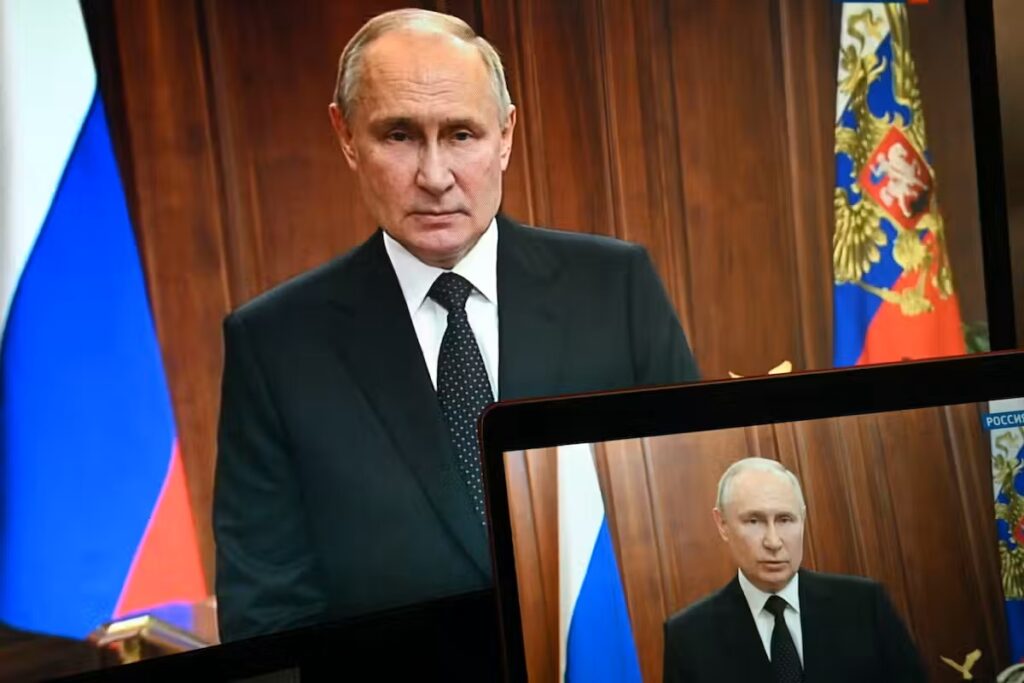What The Wagner Group Revolt Could Mean For The War In Ukraine
Jun 25, 2023 | Pratirodh Bureau
Russian President Vladimir Putin is seen on monitors as he addresses the nation after Yevgeny Prigozhin, the owner of the Wagner Group military company, called for armed rebellion (Pavel Bednyakov, Sputnik, Kremlin Pool Photo via AP)
Yevgeny Prigozhin, the leader of the Wagner Group, staged a revolt against Russia after claiming the Russian army deliberately attacked his forces. Prigozhin demanded justice — and that took the form of an armed insurrection.
Before Prigozhin reportedly backed down after negotiations with the leader of Belarus, the Wagner Group controlled key military facilities in Rostov-on-Don, the headquarters of Russia’s southern military district. Now Prighozin is reportedly fleeing to Belarus and he and his fighters will avoid repercussions.
Open hostilities between the Wagner Group and the Russian military are nothing new. The two groups have made numerous defamatory comments and taken hostile actions against each other since the start of the Russia-Ukraine war.
The attempted insurrection is largely the result of both the Russian army and the Wagner Group’s deployment in Ukraine — and the political system that underpins their actions.
Providing Plausible Deniability
The bonds between the Wagner Group and the Russian army broke down immediately after the start of the war in Ukraine. Prior to the conflict, the Wagner Group advanced Russian state interests in an unofficial capacity.
In areas where Russia had a vested interest but wanted to limit its direct involvement, like in Syria and Sudan, the Wagner Group provided the Russian government with plausible deniability.
For example, Russia used the Wagner Group to assist in its annexation of Crimea in 2014. Russia’s use of the Wagner Group in the Donbas region of eastern Ukraine in 2014 also allowed the Russian army to deny involvement. The Wagner Group and Russian military’s domains, in other words, supported the other’s objectives.
The Russia-Ukraine War altered the dynamic between the two groups. The Russian army expected a rapid military victory in Ukraine. Instead, it suffered setbacks almost from the outset of the conflict. These setbacks were so substantial that they forced Russia to deploy the Wagner Group to directly support its operations.
Helping Russia In Ukraine
In military terms, Russia’s deployment of the Wagner Group helped stabilize its operations in Ukraine.
In 2022, the Wagner Group, in contrast with the bulk of the Russian army, was a highly trained force. Wagner Group soldiers, in fact, were responsible for many of Russia’s early successes, such as the Battle of Sievierodonetsk.
These operations, however, weren’t without cost. The Wagner Group suffered such significant casualties that it couldn’t maintain its traditional tactics. Instead, the Wagner Group initiated mass recruitment efforts, including from Russia’s prisons, to replenish its depleted forces.
That blurred the lines between the Wagner Group and the Russian army. Whereas previously the two organizations had distinct spheres of influence, both now operated as, essentially, conventional forces.
Overlapping domains of influence, while forced by necessity in the case of the Russian army and the Wagner Group, aren’t exceptional for Russia.
In fact, they’re a feature of the Russian political system, and one person is responsible — Vladimir Putin.
Putin’s Influence
Ultimately, only the Russian president can arbitrate disputes among his subordinates. This not only limits the ability of Putin’s subordinates to build power bases that can challenge him, but also reinforces his importance to the political system.
This aspect of the Russian political system is highly effective in peacetime, so long as the goal is for Putin to maintain his influence and power. In times of looming conflict or outright war, however, overlapping functions can easily become a liability.
In the lead-up to Russia’s invasion of Ukraine, it became evident that Putin’s subordinates didn’t provide him with an accurate and clear picture of the capabilities of either the Ukrainian or Russian armed forces.
During the conflict itself, that meant co-operation among competing factions — in this case the Russian army and paramilitary forces — has been nominal, at best. In the worst-case scenario, these tensions can lead to open conflict, as we’ve witnessed between the Wagner Group and the Russian army.
While this tempest has seemingly passed for Putin for now, the Wagner Group is only the most prominent example of simmering discontent among paramilitary forces towards Russia.
Escape Hatch For Putin?
Ramzan Kadyrov, the Chechen leader who commands a paramilitary group of 12,000 soldiers, has previously noted problems between his forces and the Russian army.
It’s important to note that while Putin appeared to condemn the Wagner Group in his address to the nation as Prigozhin’s revolt was under way, he didn’t mention its leader by name. This omission was assuredly by design: it kept Putin’s options open in depending upon the success — or failure — of Prigozhin’s revolt.
The short-lived insurrection could still be a turning point in the war in Ukraine, but how it will shift the conflict is still uncertain.
Had it gone on longer, the revolt could have potentially provided Putin with a way to end the conflict and save face. From the outset of the conflict, Putin knew he couldn’t afford to suffer a loss in Ukraine. If he could shift blame for the defeat onto one or several scapegoats — like Wagner Group forces or other paramalitary groups who are still agitating about Russia — it could provide an exit ramp.
It could still cause a shift in the power alignment beneath Putin. He is arguably in one of the most vulnerable positions of his presidency since winning the 2000 election, but he won’t relinquish control easily.
To maintain his influence, Putin will consider any and every possibility for reasserting his dominance over Russia, with direct implications for the war in Ukraine.
(Published under Creative Commons from The Conversation. Read the original article here)
